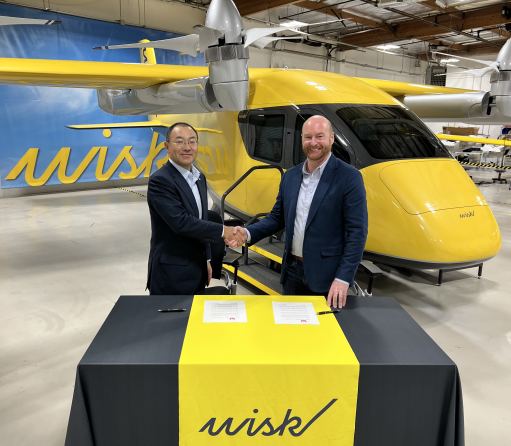
Wisk Aero and Japan Airlines (JAL) have announced a partnership to operate Wisk’s sixth-generation, autonomous electric- vertical-takeoff-and-landing (eVTOL) air taxi in Japan, part of a larger effort aimed at establishing a framework for advanced air mobility (AAM) in the East Asian country.
“When we think about the opportunity for places like Japan where you’ve got large urban populations, excess tourism and airports, but also have severe congestion, we think it’s really ripe for AAM,” says Catherine MacGowan, Wisk’s Asia-Pacific (APAC) regional director. “We think there are some really great use cases for eVTOLs in Japan, and we’re encouraged to see so many stakeholders there thinking seriously about how to safely integrate autonomous services.”
“Japan Airlines is a key airline in the region that really sees the potential of AAM, and they’re focused on it as a future business case,” MacGowan says. “They understand the local business environment, they have a strong relationship with the regulator and they see the perspective of how eVTOLs can be integrated alongside their existing fleet and operations.”
The memorandum of understanding (MoU) signed by the two companies establishes a cooperative framework in a number of areas. They include receiving Japanese type certification approval, determining MRO requirements in cooperation with JAL Engineering, developing a path to a demonstration flight in Japan, and supporting the Japanese Civil Aviation Bureau (JCAB) on the establishment of a Wisk Air Operator’s Certificate in Japan.
The MoU also spells out a framework for cooperating with the JCAB and other relevant agencies of the Japan government on matters including regulatory requirements, safety measures and community relations.
“A big part of this partnership with JAL is working with the JCAB to understand what approach they want to take, how they want to communicate and understand safety,” MacGowan says. “The JCAB is taking a really measured, thoughtful approach to AAM, and that’s something which we’re really happy to be a part of.”
Another large element of the partnership is stakeholder engagement, MacGowan adds, noting that Wisk also needs to establish dialogue with industry groups, community organizations and infrastructure companies to fully understand the needs of the Japanese market.
“There are a number of steps that we need to take to move toward operations,” MacGowan says. “We need to work with the JCAB on what their regulatory road map will look like, what the rule processes and approvals we need to work through are, and what operations, maintenance and user cases will be. We’re really setting those building blocks to enable self-flying AAM to come to Japan.”





